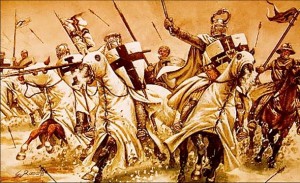 Today’s Gospel on the memorial of the beheading of Saint John the Baptist recounts the story Herod, Herodias, his unlawful wife (who had been married to his brother), Herodias’ daughter, Salome, and, of course, John the Baptist, at this point confined in prison.
Today’s Gospel on the memorial of the beheading of Saint John the Baptist recounts the story Herod, Herodias, his unlawful wife (who had been married to his brother), Herodias’ daughter, Salome, and, of course, John the Baptist, at this point confined in prison.
We all know the gist: The Baptist was imprisoned for condemning Herod’s unlawful, incestuous marriage, but Herod enjoyed listening to him. Herodias, on the other hand, saw him as a danger, a wedge between her and Herod, so sought his death. She got the chance when Herod, so enamoured of his step-daughter’s ‘dancing’ (whatever that entailed, but we may presume it was not a waltz) that he promised her ‘anything’.
Beware what you promise, especially in the throes of passion. The result was the head of the Baptist on a platter, and his martyrdom for the truth and sanctity of marriage.
I watched a brief segment last night from Jimmy Kimmel, something I rarely do, but I was intrigued. They had Miley Cyrus ‘disguised’ and interviewing a few random people for their thoughts of her. Her disguise was minimal, and her fake-Aussie accent abysmal (albeit, it is a difficult accent to imitate. The only ones to my mind more difficult are the New Zealand and South African); one man saw through her disguise almost right away.
But here is the point: A couple of the men she interviewed saw her as a malign influence, a corrupter of the young, a bad example, a sign and symptom of the degradation of America. I myself was mildly surprised by the young woman’s reaction (she is 22), which was blankness, an ironic sort of smirk, a blasé sense of ‘who cares, I’m a millionaire and successful, a winner of Grammies, with platinum sales albums’.
 Yes, poor Miley is a sign and symptom. In the interview, she even taught a couple of young women a basic move of ‘twerking’ (don’t bother). Fortunately, it was brief and fully-clothed, but has the woman no shame? Is there a twinge of conscience left in the former Disney-queen Hanna Montana, the daughter of good-ol’ boy Billy-Ray Cyrus (who may not be all that good, as a lifelong Democrat, and who seems at least somewhat supportive of his daughter’s provocative imagery), whose eighties hit “Achy, Breaky Heart” gave us the phenomenon, (which I hope and pray dies soon), of rather innocent line dancing?
Yes, poor Miley is a sign and symptom. In the interview, she even taught a couple of young women a basic move of ‘twerking’ (don’t bother). Fortunately, it was brief and fully-clothed, but has the woman no shame? Is there a twinge of conscience left in the former Disney-queen Hanna Montana, the daughter of good-ol’ boy Billy-Ray Cyrus (who may not be all that good, as a lifelong Democrat, and who seems at least somewhat supportive of his daughter’s provocative imagery), whose eighties hit “Achy, Breaky Heart” gave us the phenomenon, (which I hope and pray dies soon), of rather innocent line dancing?
Miley (whose real name is, ironically, Destiny Hope, but who was given the nickname since she was so ‘smiley’) has plumbed the depths since those early innocent days. She has simulated sex on stage with the mid-thirty-something Robin Thicke (the son of white-bread eighties-sitcom star Alan Thicke), whose own video “Blurred Lines” does not seem to blur any lines, as it delves into pornography and sex abuse. Miley has appeared unclothed on the cover of her album Wrecking Ball, and in various guises of undress and sexual innuendo in her videos and performances. (Not to be punny, but full disclosure and to avoid scandal, I have not seen a Thicke or Miley video). Alas, I did see the brief ‘interview’ which prompted this column, which was mostly innocent, but at the end of which, the young Miley allowed an older man to peek down her ‘bosom’, as I might politely put it (she used a more slang term, which I will not repeat in this G, or at least PG, rated, column). This was, apparently, to verify that she was indeed the ‘real Miley’. Hmm.
What are we willing to ‘pay’ for such dances as Miley does? It seems a lot, for she is one of the richest performers out there, and certainly is approaching ‘half’ of Herod’s kingdom. I hesitate to use the word ‘slut’, but if that sounds too pejorative, there is the alternative term ‘slattern’ or ‘harlot’. Either way, it profits a man, nor a woman we may add, nothing to gain the whole world…
I prefer a more theological term, which is scandal, one who causes another to sin by their words or conduct. Miley Cyrus, along with a number of other performers out there, in fact, nearly all of them, is a scandal, particularly to young women, who seem more and more to be imitating her, particularly in dressing, well, like slatterns. I hope their actions follow not their sartorial choice, or lack thereof.
I am not a big fan of censorship, but sometimes it is necessary, and I do think that Miley’s videos belong in the garbage. But in these days of ever-more-pervasive media, and anyone with a smartphone can instantly upload a video to YouTube, as we have seen with ISIS, censorship is a difficult proposition. Better is the capacity and virtue to make choices properly in freedom, what to watch and to which to listen. For this, one must be formed and educated, and that is done best in a good family, wherein one’s sexuality is controlled, tempered, made fruitful and life-giving.
Miley identifies in some vague way as ‘Christian’, and almost entered family life, being engaged to no less than Thor’s brother, Liam Helmsworth, but she now describes herself as ‘pansexual’ (whatever that means), and, as she apparently said, ‘would love anyone who loves her for who she is’.
Who are you, Miley, and do yourself even know who the real Miley is? I hope you are just a confused young woman, like the manipulated Salome and know not what you do, but perhaps you are more calculating than that, rather like Herodias, and know where the money and attention are. More than likely, you are a bit of both.
That is the problem with sin, that, to paraphrase Pascal, it distances us from who we are, and what we really want. Our conscience becomes dull, and eventually blind, and we become blank and oblivious to the evil we do to ourselves, and to others. Herod found that out to his downfall, although his conscience still plagued him (a good sign, which could lead to repentance). We know not what happened to Herodias and Salome. I just hope they saw the truth before the end, just as I hope the same for young Miley, whose conversion to her Christian roots would go a far way to undoing all the scandal and bad example. In the meantime, unlike Herod, we can do what we can to avert our eyes.
On this, Miley’s or our own conversion (for conversion is never done!), I would not put much hope on Thor or his brother, but we can all hope in Christ and the prayers of his cousin, the Baptist. The tragedy is that Saint John paid only with his head; we are paying with the very souls of our young.









